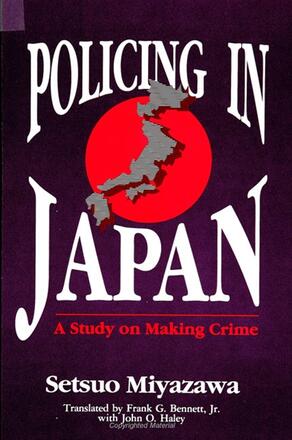
Policing in Japan
A Study on Making Crime
Alternative formats available from:
An observational study of the Japanese detective.
Description
This book is an observational study of the Japanese detective, demonstrating with extensive field data the process of criminal investigation. It is the first in-depth study of the Japanese criminal justice system at work. Utilizing Ericson's concept of "making crime," Setsuo Miyazawa analyzes the restraints under which Japanese detectives work, and the unique freedoms they have in the investigative process in comparison to American police generally. He also provides a comparative analysis of law enforcement in Japan, the United States, and Europe, and questions how effectively these systems evaluate and enable investigative police work.
Setsuo Miyazawa is Professor of Law at Aoyama Gakuin University and Senior Professor of Law at the University of California Hastings College of the Law.
Reviews
"This is the best book on policing in Japan in English or Japanese. For students of law and society in Japan and of policing in democratic countries, it remains as relevant today as when it was first published a quarter century ago. Japanese police continue to 'make crime' in a legal environment that promotes their interests in clearing cases and taking confessions. If you want to know how they make suspects sing in more than 90 percent of the cases that go to trial, read this book. If you want your students to think about why false confessions occur, assign this book to them. And if you want to know why Japanese police manipulate crime statistics, consider what Setsuo Miyazawa says about the consequences of working in an organizational culture where failure is impermissible. " — David T. Johnson, author of The Japanese Way of Justice: Prosecuting Crime in Japan
"…the work is an informative and valuable contribution to the international and comparative literature on policing. " — Dennis Forcese, Canadian Journal of Sociology
"This book is a welcome addition to the long tradition of writing on the police. Indeed it is a landmark in criminal justice scholarship. It is written by a scholar equally at home in English-speaking and Japanese scholarly traditions. As such it should be of interest to scholars of the police and criminal justice administration throughout the world.
"I think this is a terrific book. Its strength is that it will fill a huge void. There is a substantial demand for intelligent discussions of the Japanese police. " — Malcolm Feeley, University of California, Berkeley
"This work is very original and represents an extremely important addition to scholarship regarding a group (Japanese detectives) that has never before been studied on the site. The insight it provides into Japanese culture is an important derivative product.
"Crime cases always have an inherent appeal, and when they illuminate how the 'inscrutable' Japanese detectives truly operate, their feelings, concerns, the way they regard and respect (and fail to do both) legal dictates, adds a real appeal to this work. The summary material is first-rate, and the questionnaires are an added plus.
"This is a fine cross-cultural contribution, done not by an outsider who is very likely to be fed, at least in some part, the party line, but by an insider who understood the language, was keenly aware of nuances, and spent a very great deal of time on field work. " — Gilbert Geis, Professor Emeritus, University of California, Irvine